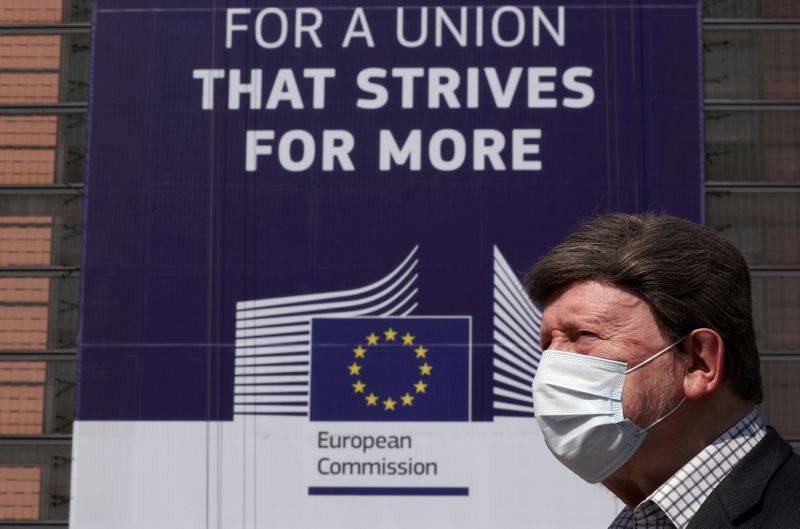By Jan Strupczewski
BRUSSELS (Reuters) - European Union leaders will move on Thursday towards joint financing of a recovery after the coronavirus pandemic by asking the European Commission to propose a fund sufficiently big to target the most affected sectors and regions.
Many leaders see the massive joint recovery financing as a crucial tool of EU solidarity as some in the 27-nation bloc will have a harder time than others regaining their economic footing after the deepest-ever EU recession this year.
"The idea of having a special instrument to deal with the crisis is starting to be consensual," said one senior EU official involved in the preparation of the Thursday summit.
A more even recovery, thanks to the joint financing, would help preserve the EU's cherished single market of 450 million people and keep at bay eurosceptic parties trying to capitalise on popular resentment of EU economic inequalities.
"I propose that we task the Commission to analyse the exact needs and come up with a proposal that is commensurate with the challenge we are facing," the chairman of the EU summit, Charles Michel, wrote in an invitation letter.
The leaders are likely to give the EU executive arm until the end of April or shortly afterwards to come up with the size of the Recovery Fund and ways to finance it, officials said.
The sums floated in proposals ahead of the summit are huge, ranging from 1 trillion to several trillion euros. But it is the method of raising the funds and whether they should be disbursed as loans or grants that are the most contentious issues.
France and Spain have presented proposals that involve joint debt issuance - an option firmly rejected by Germany, the Netherlands and several other countries.
RED LINES
The Commission has suggested a compromise - it could borrow on the market against the security of the future EU long-term budget, leverage the money using methods tested over the past five years and lend it cheaply to governments.
But some countries argue that grants, rather than loans, are the way to go, because that would help avoid a large buildup of debt in the already highly indebted countries - another idea hard to swallow for the more frugal camp.
A possible compromise could involve using both the EU's next long-term budget for 2021 to 2027, which would disburse grants, and the Recovery Fund, which would operate on the basis of loans.
"The leaders will outline their preferences and red lines to the Commission at the summit and von der Leyen will then have to come back with a proposal that will suit everybody," one EU diplomat said, referring to Commission head Ursula von der Leyen.
Once the Commission presents its proposal, the leaders would discuss it again with a view to adopting it by June. But a final decision may take longer, officials cautioned, because of the complexity of talks over the EU budget, called the Multi-annual Financial Framework, or MFF.
"The Commission proposal should clarify the link with the MFF, which will in any event be at the heart of the EU's contribution to recovery and will need to be adjusted to deal with the current crisis and its aftermath," Michel said.
German Finance Minister Olaf Scholz told the ARD broadcaster he was convinced that leaders would use the summit to discuss what funds were needed and the next step would then be to think about how best to finance a recovery package.

"For us, it's clear that has to be something that is best handled as part of discussions about the EU budgets in the coming years, in the so-called multiannual financial framework which is soon to be decided upon," he said.
